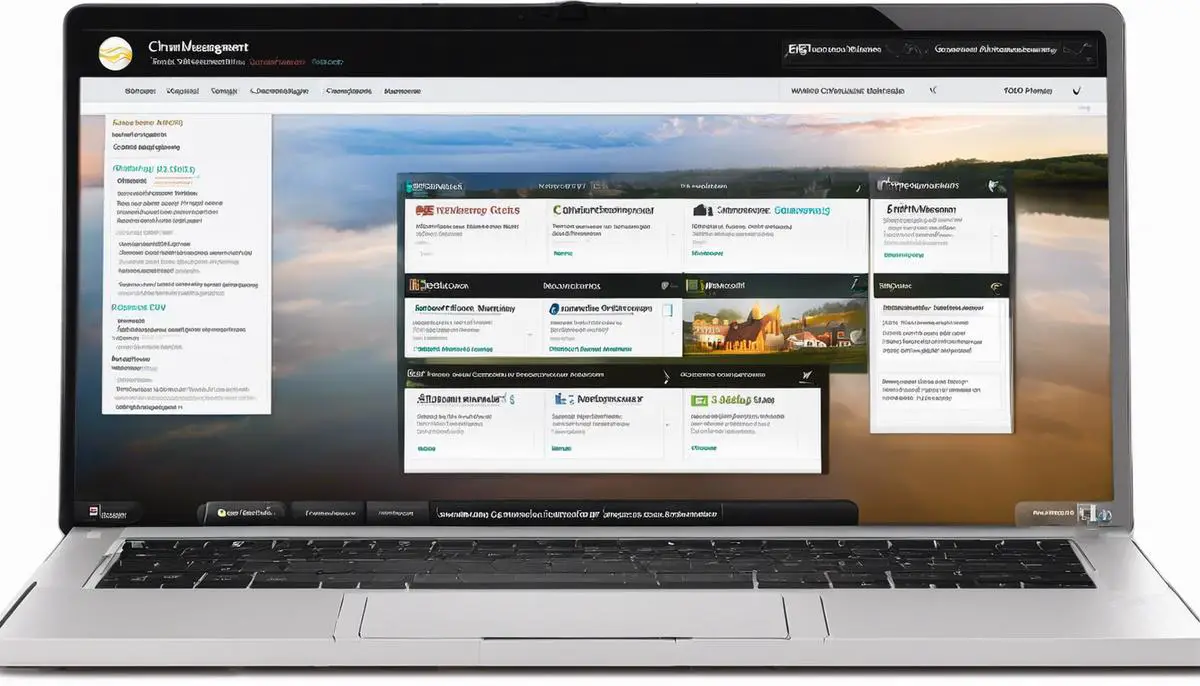In the digital age, the fusion of technology and spirituality may seem incongruous at first glance, yet it holds the potential to catalyze the age-old traditions of community and faith into a new era of efficiency and connection. Church management software represents a groundbreaking pivot for faith-based organizations, seeking not just to streamline their day-to-day operations but to create a richer, more engaged community. This essay journeys into the heart of modern church management systems, exploring how their sophisticated features and benefits are not merely a nod to modernity but a boon to the sacred mission of these establishments. From fostering a sense of community through adept engagement tools to handling mundane administrative tasks with unprecedented flair, these platforms are redefining what it means to run a place of worship in the 21st century.
Key Features & Benefits
Revolutionizing the Pews: Game-Changing Features in Modern Church Management Software
In the fast-paced world of business and innovation, industries across the board are undergoing digital transformations—and the realm of religious organizations is no exception. Let’s dive into the latest trend shaking the foundations of faith-based management: cutting-edge church management software (ChMS).
Cloud-Based Operations: Anytime, Anywhere Access
The days of managing congregations from dusty back-office computers are long gone. Today’s ChMS runs on the cloud. This means pastoral staff and volunteers can access church databases, financial platforms, and communication tools from any location and on any device. Think efficiency, think dynamic access—think growth.
Integrated Communication Tools That Reach the Masses
Communication is vital in keeping a congregation connected. Modern ChMS offers robust, integrated communication options. From automated emails, push notifications to social media integration; these platforms ensure messages touch every soul without getting lost in the earthly noise of a cluttered inbox.
Financial Management With Divine Precision
Churches handle donations, expenses, and sometimes even retail operations—yes, the business side is real and sanctified. The latest ChMS comes armed with financial management features, from tracking tithes and offerings to generating year-end giving statements with immaculate accuracy. The best part? It simplifies tax compliance; thus, rendering unto Caesar has never been easier.
Engagement Analytics: Understanding the Flock
Knowledge is power, even more so when it comes to understanding the needs and involvement of a congregation. Today’s ChMS can track attendance, event participation, and volunteer engagement, painting a clear picture of where the ministry is thriving and where it may need a boost.
Security Features: Protecting the Sanctuary
With cyber threats lurking in every corner of the digital world, top-tier ChMS prioritizes security. Encryption, strong user authentication, and rigorous data backup protocols are no longer optional—they are the pillars that protect sensitive information and maintain the trust of churchgoers.
In conclusion, in a digital age where interactivity, accessibility, and data security reign supreme, churches are embracing these game-changing features from user-friendly church management software solutions. Gone are the days of antiquated spreadsheets and disconnected communication. Today, faith-based organizations wield tools that harness the power of technology to shepherd their missions, prove stewardship, and extend their ministry far beyond the church walls.

Integration and Compatibility
Harnessing the Power of Centralized Data in Church Management
In today’s fast-paced world, innovation is the key to efficient operations, even in the realms of faith-based communities. A church is more than just a place of worship; it’s a bustling hub of activity, and managing it requires modern solutions. Streamlining church management through seamless integration of its systems isn’t a luxury—it’s a pressing necessity.
Imagine a church where member profiles, attendance, volunteer scheduling, event management, and resource allocation flow through a harmonized pipeline. This isn’t a futuristic dream; it’s the power of centralization in church management systems. When databases talk to each other, when information is a click away, and when systems work together like cogs in a well-oiled machine, the mundane tasks fade into the background, and the focus can return to spiritual guidance and community building.
Customized Member Portals: Your church members yearn for connection, and creating a bespoke virtual space elevates this experience. Customized member portals are a game changer. Through them, church members can update personal information, set up recurring tithes, register for events, and request prayers—all in a secure, user-friendly environment. This doesn’t just optimize a church’s administrative functions; it empowers its congregation.
Resource Optimization: Clarity is king. Having a bird’s-eye view of the church’s resources allows for precise decision-making. With centralized church management systems, tracking asset utilization, room bookings, and material resources avoids conflicts and wastage. This translates to more funds funneled into community outreach and ministry work, rather than getting tied up in logistical quandaries.
Personalized Communication: Responding to individual needs with a personal touch is the cornerstone of an engaging church community. By leveraging integration, churches can segment their communication based on interests, age groups, and levels of participation. This precision ensures that each member receives relevant information, fostering a sense of belonging and active participation. Moreover, volunteers and staff can connect through centralized platforms, consolidating schedules and efforts in one cohesive action plan.
With seamless integration, the potential for a truly dynamic church management system is unleashed, transcending traditional boundaries. Technology, when adopted and utilized to its fullest potential, can revolutionize church operations, making the sacred task of church management as fluid as the sermons that inspire hearts and minds. It’s not just about staying current with trends; it’s about harnessing the best of technological advancements to nurture and grow faith communities in an ever-changing world. Embrace integration, enable innovation, and witness your church thrive.

Data Security and Privacy
In tackling the issue of cyber security within church management solutions, one must understand the stakes involved. The heart of the matter is trust—trust that the very institutions dedicated to the spiritual care of their communities have secured their confidences against the rampant threats in the digital age.
As savvy as the most cutting-edge tech firms, today’s church management software (ChMS) is stepping up to the challenge with vigor and vigilance. They’re employing robust encryption that would make even the most audacious hacker think twice. After all, data regarding personal details, donation records, and sensitive communications must be safeguarded with the highest levels of cyber defense.
Moreover, these ChMS platforms often incorporate multi-factor authentication (MFA), making sure that those accessing the system are precisely who they say they are. This layer of protection is akin to double-locking the doors of the church—both physically and digitally. Additionally, role-based access is becoming a standard. This means that information is not just a free-for-all buffet but is served up selectively, based on a person’s position and need to know.
Regular security audits are the vigilant shepherds of the digital arena. By evaluating potential vulnerabilities proactively, ChMS can adapt and armor-up against emerging threats. Consider it akin to scouting the horizon for dark clouds even when the current skies are clear—a prudent and necessary step in maintenance.
Disaster recovery and backup protocols are the unsung heroes. With data securely backed up, churches have the assurance that, even in the face of a digital storm, they can restore systems to their former glory without losing step with their mission or the sanctity of their congregants’ information.
So, how secure are church management solutions? They must be Fort Knox-like in their security measures, recognizing that the data they guard is not merely information but is a sacred trust placed in them by the individuals and communities they serve. With state-of-the-art security protocols, ChMS providers stand as the watchmen on the walls in this digital epoch, ensuring that while the church doors remain open to all, cyber threats are kept firmly at bay.

Cost-Benefit Analysis
Investing in top-tier church management software is akin to building a strong foundation for a growing congregation. Consider the advantage of automating routine tasks that previously consumed hours of valuable staff time. By streamlining administrative functions, churches are able to direct more focus and resources towards their core mission – ministry and outreach.
It’s the age of data-driven decision making and churches are no exception. Premium church management systems offer robust reporting capabilities. Need to identify patterns in giving or attendance? Want to track the success rate of events and programs? Reports that once took days to compile are now readily available, offering insight that empowers churches to make informed decisions, encouraging growth and stewardship.
The rigidity of old-school management systems can stifle the dynamic nature of church activities. In contrast, premium church management software delivers flexibility. From custom reporting to unique member management features, customization is the king, ensuring that each church’s specific needs are met with precision.
Moreover, these innovative systems provide an array of options for digital giving which is a game-changer for maintaining and increasing tithes and offerings – the financial lifeline of any congregation. By offering easy online, mobile app, and text-to-give options, churches tap into modern giving habits, making it convenient for members to contribute to the mission.
Don’t overlook the potential of maximized volunteer engagement. Through sophisticated scheduling systems, churches can manage their volunteers more effectively, ensuring that no area of ministry is short-staffed and that volunteers are utilized according to their strengths and availability. This often leads to higher satisfaction among volunteers and, in turn, a stronger, more committed volunteer workforce.
Finally, think about the long-term financial sustainability that comes with leveraging a top-notch church management software. Advanced platforms can scale with a church’s growth, preventing the need for costly upgrades or migration to new systems down the road. They’re built to accommodate expansion, whether it’s increasing membership or adding additional campuses.
In conclusion, premium church management software is not merely an expense; it’s an investment in a church’s infrastructure, offering returns through increased efficiency, data-driven insights, enhanced giving, and strategic growth. It’s a strategic move that aligns with modern financial stewardship and paves the way for a thriving ministry in the digital age.
The decision to embrace church management software is more than a choice; it’s an investment in the future of faith-based communities. As we explored the monumental features, seamless integration, unassailable data security, and the undeniable economic sense of using these systems, it’s evident that this is the path forward for churches aiming to flourish in an ever-evolving digital landscape. The insights provided shed light on the transformative power of technology, extending the reach of their spiritual mission and fortifying the very fabric of their communities. In an epoch where information is paramount and connections are formed in the blink of an eye, these software solutions stand as vital tools for the church, ready to weather the tides of change while holding steadfast to their timeless values.













